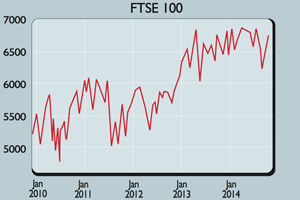British blue-chip stocks lag rivals
The FTSE 100 has been one of the worst performing of the world's biggest stockmarkets.

Get the latest financial news, insights and expert analysis from our award-winning MoneyWeek team, to help you understand what really matters when it comes to your finances.
You are now subscribed
Your newsletter sign-up was successful
Want to add more newsletters?

Twice daily
MoneyWeek
Get the latest financial news, insights and expert analysis from our award-winning MoneyWeek team, to help you understand what really matters when it comes to your finances.

Four times a week
Look After My Bills
Sign up to our free money-saving newsletter, filled with the latest news and expert advice to help you find the best tips and deals for managing your bills. Start saving today!
Britain "has been the wrong place to invest this year", says Bryce Elder in the Financial Times. Last week, the FTSE 100 was ranked 19th in a table of the world's 20 biggest stockmarkets' year-to-date performances.
It has declined marginally since early January. The British blue-chip stocksindex was also conspicuously slow to make up lost ground after October's wobble.
The index "is always going to struggle" when there is badnews for commodities, says Trustnet Direct's Tony Cross. Oil and mining companies make up 25% of the index, compared to an average of 6% in other developed markets.
MoneyWeek
Subscribe to MoneyWeek today and get your first six magazine issues absolutely FREE

Sign up to Money Morning
Don't miss the latest investment and personal finances news, market analysis, plus money-saving tips with our free twice-daily newsletter
Don't miss the latest investment and personal finances news, market analysis, plus money-saving tips with our free twice-daily newsletter
China has just reported its biggest decline in imports for eight months, implying lower demand for raw materials. A resilient pound, meanwhile, has undermined earnings expectations, as 77% of FTSE 100 sales are made overseas although that may change rapidly as the US dollar strengthens.
The political backdrop, moreover, has become unusually uncertain. As the May 2015 general election approaches, investors may become "increasingly exercised about the wide range ofoutcomes", says Fidelity's Tom Stevenson in The Sunday Telegraph.
A recent poll suggested that no two parties could form a majority under the likely tally of seats. A messy three-party coalition and another election shortly afterwards are both distinct possibilities.

Income investors also have reason to worry. The FTSE 100 offers an attractive-looking yield. But oil firms' payouts, worth 15% of total dividends, could be under threat at a time when underlying dividend growth for the index as a whole is at a four-year low.
On the plus side, sterling has weakened recently, which looks set to continue as British and US monetary policy diverges. Meanwhile easy money is still pushing stocks higher, and any European quantitative easing would no doubt be felt here too.
But it wouldn't be much of a surprise if the index as a whole continues to lag next year. We look at some of the best individual stocks in this week's cover story.
Get the latest financial news, insights and expert analysis from our award-winning MoneyWeek team, to help you understand what really matters when it comes to your finances.

-
 Should you buy an active ETF?
Should you buy an active ETF?ETFs are often mischaracterised as passive products, but they can be a convenient way to add active management to your portfolio
-
 Power up your pension before 5 April – easy ways to save before the tax year end
Power up your pension before 5 April – easy ways to save before the tax year endWith the end of the tax year looming, pension savers currently have a window to review and maximise what’s going into their retirement funds – we look at how